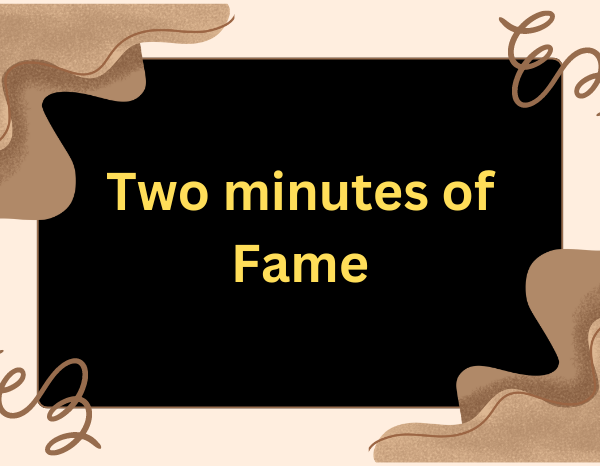
Two Minutes of Fame
Introduction
Did your eyes well up with tears when you watched your child step on stage to recite a few lines from a poem? Have you ever felt that shiver run down your spine when your child holds the microphone for the first time? Enthusiastic parents applaud and appreciate their child’s performance on stage and there is nothing wrong with it. For that one minute ( and if they are lucky , two minutes) of well-deserved limelight that their child gets, some parents manage to sit through the whole show, though most of them do not seem to show any interest in the performance of ‘other’ children. Constant reminders have to be given by the school management to appreciate and encourage the ‘performers’.
The ‘Big’ Event
Ever wondered how much time and effort goes into all this? Well, before the academic year begins, the general skeleton is laid out and from the very first day, teachers and administrative members are given an orientation, after which the wheels begin to roll. From content creation, to auditions, student selection, direction, consistent rehearsals, costume designs, on and off requests and complaints from parents regarding their child’s role, the entire staff is on its toes. Numerous changes in the school timetable and sacrificing lessons have an adverse impact on students and the process of learning. The expenditure is borne both by parents and the school and getting the right costume can be a tedious task for parents.
The Aftermath
After the conclusion of such events, there will be surge of feedback, both negative and positive. There is some degree of resentment, as some parents feel that their children did not get enough time on stage as compared to others.
Returning to academics requires an extra effort by the overworked teachers, while students who have lost momentum find it difficult to focus, only to realize that they are suddenly flooded with tests, home assignments and examination! During rehearsals, the pressure on teachers to put up a great show, results in all their energy being focused on the ‘big day’. They are also aware that they will be answerable if the curriculum objectives and deadlines are not met. Few may resort to cutting corners, while many dedicated ones find it impossible to complete the academic tasks in a manner that will benefit the students. Working under pressure, particularly while imparting knowledge, does not result in positive learning. The tasks appear ‘uphill’ and almost unachievable. While trying to cram lessons in limited time, neither do students learn, nor are the teachers satisfied. Parents find themselves helpless. As both parents have full-time jobs, they find the additional homework and the onset of tests right after the event (not to forget the exam right around the corner), overwhelming. Another round of parents’ complaints and meetings with teachers results in no favourable outcomes. Some resort to tuitions and academies to get through the exam. A fast forward approach, shortcuts, corner cutting, rote learning, that students resent (and they cannot recall a week after the exam), are only some of the issues.
The Takeaway
So what is the purpose of such ‘big’ events? While it is an ‘antiquated’ marketing tool, many do not even think twice before diving into the self-created trap just because everyone else is doing it. Many claim that it boost students’ confidence and provides a break from the ‘norm’. My question is: Confidence for what? How many of us would want our children to be theatre artists, singers, actors, etc. For that, we can always have a dramatic club if there is demand for it. Presenting before other students, staff members and sometimes parents will provide the ‘relevant’ confidence and will ensure that each student gets ample time and a level playing field. Group work, group leaders, research, projects, followed by in-depth presentations and public speaking skills are areas to be focused on if the aim is to boost confidence.
As far as a break from the ‘norm’ is concerned, we must first identify the ‘norm’. Why is the norm a typical lesson involving a lecture, a minimal class discussion, followed by written work? We need to change the norm. We must work on practical lesson plans. This will ofcourse require another in-depth discussion, but teaching life skills can always provide a break from the norm and benefit everyone.
Parents must also look for schools which have a holistic approach, rather than make a perception based on a ‘big’ event that appears even grander on the school’s official instagram and facebook account. Conscious parents can communicate what they would like their child to gain from their journey. One year of academics with almost half of it wasted on such events, will not result in anything more than a minute’s presence of your child on stage and a momentary adrenaline rush. Schools must take responsibility and set out objectives for all activities and events and evaluate the outcomes.
The ‘two minutes of fame’ are definitely not worth the time and effort.
The author is an educationist with almost twenty years of teaching and curriculum development experience in various prestigious educational institutes of Pakistan, in a vast array of subjects (elementary, middle and high school).

